A WORKSHOP ON AVERROES AND HIS PHILOSOPHY presented by
The Aquinas and ‘the Arabs’ International Working Group
Thursday & Friday 27-28 June 2013
Marquette University, Milwaukee, WI

A WORKSHOP ON AVERROES AND HIS PHILOSOPHY presented by
The Aquinas and ‘the Arabs’ International Working Group
Thursday & Friday 27-28 June 2013
Marquette University, Milwaukee, WI





Thanks to all participants for the wonderful experience of two days of vigorous discussion, delightful disagreement, and congenial exploration of complex philosophical and cultural issues concerning the thought of Ibn Rushd / Averroes. Particular thanks to Dr. Matteo DiGiovanni and Dr. David Twetten for valuable presentations and enthusiastic participation in every part of this event.
Richard Taylor 29 June 2013
A Workshop on Ibn Rushd / Averroes and His Philosophy
27-28 June 2013 at Marquette University, Milwaukee, Wisconsin
with presentations by Matteo di Giovanni, Richard C. Taylor, et alii (TBA)
Organizer
Prof. Richard C. Taylor, Marquette University
Sponsored by the Aquinas and ‘the Arabs’ International Working Group
for the deeper understanding of Arabic philosophy and its influence
This is a Two-Day Workshop
with the second day devoted to selected contributed papers.
This Workshop is intended to provide a formal occasion and central location for discussion of the thought of Ibn Rushd / Averroes, Topics to be considered include: philosophy in the Andalusian context; Ibn Rushd and his Greek and Arabic sources; method in philosophy and religion; the nature of human intellect; providence; creation; cosmology; prophecy; the afterlife; Ibn Rushd and issues of Latin Averroism; and more.
Conference Proposal Submission Guidelines
Contributed papers will be allowed ca. 40 min. for presentation with 15 min. for discussion.
Established Scholars: send a title and abstract of 150 words.
Graduate Students: send a title, abstract of 150 words, CV and a supporting letter from your faculty advisor or dissertation director.
Send applications by email to Prof. Richard C. Taylor at Richard.Taylor@Marquette.edu.
LIVE ON-LINE PRESENCE AT THE WORKSHOP: Note that we are willing and interested in considering submissions of proposals for presentations made through the internet. We have the necessary technology for this at Marquette University.
If there is sufficient interest, the Workshop will be available live on-line to those interested but not physically present in Milwaukee. Update 24 June 2013: Due to too little interest, live online streaming will not be available.
OPENING DATE FOR SUBMISSIONS: 10 January 2013.
The Selection Committee will choose presenters on the basis of quality of proposals (title and abstract) and scholarly record as the primary criteria.
PROGRAM ANNOUNCED: 1 June 2013 or earlier. The first review of submissions will take place March 1, 2013. After that submissions will be reviewed in rolling basis until the Program is complete. Update 24 June 2013: Program complete.
CONFERENCE FEES: none.
(Refreshments available at vending machines and at the Student Union Coffee Shop)
-------------------------------------------------------------------------------------------------------
Registration Form.
=> ALL ATTENDEES (including the Marquette community) are asked to register.<=
NAME:
TITLE:
ACADEMIC AFFILIATION:
ADDRESS:
EMAIL ADDRESS:
TELEPHONE:
Please send your Registration Form to:
Prof. Richard Taylor
Philosophy Department
Marquette University
P.O. Box 1880
Milwaukee, WI 53201-1881
Contact information: email Richard.Taylor@Marquette.edu or mistertea@mac.com
Telephone: 414-288-5649 (office)
Registered Attendees, including presenters:
Prof. Jeff Macy, Hebrew University
Prof. Bonnie Kent, University of California, Irvine
Prof. Owen Goldin, Marquette University
Mr. Mehmet Zahit Tiryaki, Yale University
Nicholas Oschman. Marquette University
Jacob Andrews. Marquette University
Yehuda Halper, Tulane University
Nathan Blackerby, Marquette University
Stephen R. Ogden, Yale University
Daniel DeHaan, University of St Thomas (Houston) & Katholieke Universiteit Leuven, Belgium
Matteo DiGiovanni, Yale University
Richard C. Taylor, Marquette University
Conference Schedule (final 24 June 2013)
All sessions will be held in the Beaumier Conference Center in the lower level of Raynor Library at 1355 W. Wisconsin Ave.. (See below for location link.)
Thursday 27 June 2013 : Beaumier Conference Center, Raynor Library
Lectures and discussion by Richard Taylor and Matteo DiGiovanni
9-9:55 am (1) “Averroes and His Historical Context”
10-11 am (2) “Averroes on method in religion and philosophy”
11-11:25 Break for coffee / tea from the Brew Bayou
11:25 am-12:25 pm (3) “Averroes on the intellect, with some remarks on the afterlife”
12:30-1:30 pm (4) “Averroes on cosmology”
1:30-3:00 pm Lunch: suggestions: the MU Law School, AMU (Student Union), Subway, Jimmy John’s Subs, Qdoba, Miss Katie’s Diner, and more in the immediate area.
3:00-4:30 pm (5) “Averroes on creation (with some remarks on providence)”
4:30-4:40 Short Break
4:40-5:40 pm (6) “Averroes on metaphysics”
Dinner suggestions to be announced.
Friday 28 June 2013: Beaumier Conference Center, Raynor Library
Contributed presentations
9-10 am Dr. Yehuda Halper, Tulane University, “The Literary Forms of Averroes’ Three Commentaries on Metaphysics Δ: Some Remarks on How to Read Averroes”
10:00-10:05 break
10:05-11:05 Mr. Stephen R. Ogden, Yale University, “Reviving the Crucial Agreement of Averroes and Aquinas on De Anima III.4-5”
11:05-11:30 Break
11:30-12:30 Mr. Daniel DeHaan, University of St Thomas, Houston, “Avicenna and Averroes on the Accidentality of wujūd”
12:30 - 1:00 Closing discussion
+++++++++++++++++++
CONFERENCE LOCATION:
Conference sessions will take place in the Raynor Library (1355 W. Wisconsin Ave.), Room 330B. Thursday and Friday, June 27-28, 2013. For information on the Raynor Library and nearby parking see https://www.marquette.edu/contact/finder/raynor.shtml and the links there.
HOUSING:
On campus housing is available at a modest cost ($49 single; $70 double = $35 per person). To reserve a room contact the housing office directly: Carrie Enea at 414-288-4737 or via email at carrie.enea@marquette.edu. Cut-off date for room reservations: May 23, 2013. Rooms requested after the cut-off date are subject to availability.
Rooms will be at Straz Tower, 915 W. Wisconsin Avenue, a three block walk from the conference location.
PARKING:
Structure 1, located on 749 N. 16th Street, and Structure 2, located at 1240 W. Wells St ., have been designated the university’s visitor parking facilities. For information on the costs of parking ask at the check-in desk at Straz Tower, 915 W. Wisconsin Avenue.
Daytime visitors’ parking 6 am - 5 pm is ca. $5.00 per day at these structures.
Overnight parking (ca. $6) can be arranged at the check-in desk at Straz Hall.
New: For parking information, click here or go to: https://www.marquette.edu/about/visitor_parking.shtml.
HOTELS:
Just a few blocks East from Marquette University is the Holiday Inn Milwaukee City Center, 611 West Wisconsin Ave., Milwaukee, WI 53203. Tel. 1-414-273-2950.
For further information on the hotel, see http://www.ichotelsgroup.com/h/d/hi/1/en/hd/mkecc?irs=null
A few blocks West from Marquette University is the very charming Ambassador Hotel: 2308 W Wisconsin Ave., Milwaukee, WI 53233. Tel.(414) 342-8400
For further information on the hotel, see www.ambassadormilwaukee.com
(Mention that you are attending a Marquette conference may get you a discount. Be sure to ask.)
DIRECTIONS AND MAPS:
For directions to the Marquette Campus, see https://www.marquette.edu/contact/directions/
For a map of the Marquette University campus, see https://www.marquette.edu/contact/CampusMap.pdf
For a map of downtown Milwaukee, see
http://www.wisconline.com/counties/milwaukee/map-downtown.html
For parking information, click here or go to: https://www.marquette.edu/about/visitor_parking.shtml.
TRAVELING TO MARQUETTE UNIVERSITY (& DOWNTOWN MILWAUKEE) FROM
MILWAUKEE’S MITCHELL AIRPORT:
For a shuttle, see http://www.mitchellairport.com/getting.html
Downtown Milwaukee: info from http://kiwinc.itgo.com/mwc/mitchell.html
* Expect a taxi to cost around $30 or more due to fuel costs.
* Most convenient: Airport Connection shared ride van serves a frequent loop of most downtown hotels. http://mkelimo.com/ ($15-20)
* Cheapest: MCTS bus route 80 serves 6th St. downtown, next to the Frontier Airlines Center and nearby hotels. Travel time is 25 minutes, often only a few minutes longer than taxi or van.
http://www.ridemcts.com/routes_and_schedules/schedule.asp?route=80
Straz Tower is at 9th and Wisconsin.
The Conference Center is in the lower level of Raynor Library at 1355 W. Wisconsin Ave.
Midwest Seminar in Ancient and Medieval Philosophy link:
http://web.mac.com/mistertea/Midwest_Seminar/Welcome.html
Aquinas and ‘the Arabs’ Project link:
MARQUETTE UNIVERSITY PHILOSOPHY DEPARTMENT link:
https://www.marquette.edu/phil/
Conference Abstracts in Alphabetical Order
Blackerby, Nathan, Marquette University
“Averroes and Aquinas on Potentiality in Separate Substances”
ABSTRACT: This paper analyzes Averroes's conception of potency in intellectual substances and the hierarchical order among them that follows as a result of their gradation of potency. The potential intellect marks the lowest position within the hierarchy, such that it requires content from perceptual experience for it to be actualized. As such, the potential intellect has an essential relation to the human body and its psychological processes. I consider key texts in the work of Thomas Aquinas which show that he adopted Averroes notion of potentiality in intellectual substances, providing him a basis for rejecting Platonic dualism and universal hylomorphism.
DeHaan, Daniel, University of St Thomas (Houston)
“Avicenna and Averroes on the Accidentality of wujūd”
Averroes’s destruction of al-Ghazali’s destruction took the metaphysical thought of Avicenna as one of its targets. Among Avicenna’s philosophical errors was his characterization of wujūd as accidental to quiddities in re. This metaphysical disagreement will be the subject of the present study. I will begin with Averroes’s critique of Avicenna from the Tahafut al-Tahafut and his use of al-Fārābī’s Kitāb al-Ḥurūf. I shall then turn to Avicenna’s own account of the accidentality of existence as it is presented in his work of Peripatetic first philosophy, The Metaphysics of the Healing. Central to a proper understanding of Avicenna’s doctrine is his use of the five Porphyrian predicables. It will be shown that Averroes’s misunderstood Avicenna, and that this was partially due to his failure to distinguish between categorical and predicable accidents. Contrary to Averroes, Avicenna did not confuse the sense of wujūd as truth with wujūd as a quiddity in re, because he did not accept this Farabian doctrine of being. Instead Avicenna holds that wujūd is accidental to māhiyya, not as a predicamental accident, but as a sui generis predicable accident, which is prior to māhiyya and is caused by another; another that is a necessary efficient cause of wujūd.
Halper, Yehuda, Tulane University
“The Literary Forms of Averroes’ Three Commentaries on Metaphysics Δ: Some Remakrs on How to Read Averroes”
Why Averroes decided to write three different commentaries, short, middle and long, exploring at least five of Aristotle’s philosophical texts is still an open question in Averroes scholarship. Earlier scholars of Averroes attempted to answer this question with broad generalizations about Averroes’ intentions in his works. More recently, scholars, such as Alfred Ivry, Joseph Puig Montada and Steven Harvey, have been looking at internal evidence from the commentaries themselves to explain the various approaches Averroes takes in his different commentaries to different works of Aristotle. Here, I examine the literary forms of Averroes’ three commentaries on Metaphysics Δ, in order to determine Averroes’ intentions in writing the commentaries, their place within Averroes’ science and course of instruction, as well as their intended audiences. I pay special attention to the limitations imposed by the literary forms and Averroes’ ways of reaching beyond those limitations. I have chosen to focus on Book Δ of the Metaphysics because Averroes himself attaches great importance to it, but also because it is not immediately clear why this book is so important. I claim that through careful consideration of Averroes’ style of writing in his three commentaries on Metaphysics Δ, we can begin to see not only the importance of this often overlooked book of the Metaphysics, but also how Averroes develops his own metaphysics.
Ogden, Stephen R., Yale University
“Reviving the Crucial Agreement of Averroes and Aquinas on De Anima III.4-5”
Contemporary commentators on Aristotle’s De Anima III.4-5 often dismiss or overlook an important core interpretive move made by both Averroes and Aquinas. However much the two disagree on the separate substantiality of the intellects, the persuasive key to both their interpretations is an all-or-nothing reading of the immateriality of both the material/possible intellect (MPI) and the active intellect (AI). In their commentaries, Averroes and Aquinas both recognize that the MPI as described in III.4 must, like the AI in III.5, be separable, impassible, and unmixed. Therefore, any attempts to attribute only the MPI to humans and to characterize it as essentially attached to our bodily nature are undermined. This also means that the description of passible intellect at the end of III.5 cannot be identified with the MPI, so a third faculty must be introduced. I argue that this basic shared reading provides a crucial corrective and should revive Averroistic and Thomistic interpretations of Aristotle.
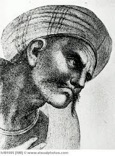
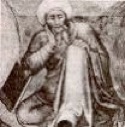
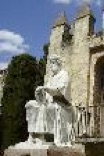
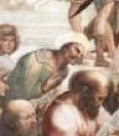
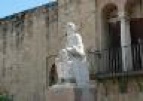








al-Farabi Avicenna Averroes Maimonides Gersonides Ibn Gabirol Augustine Aquinas Scotus


